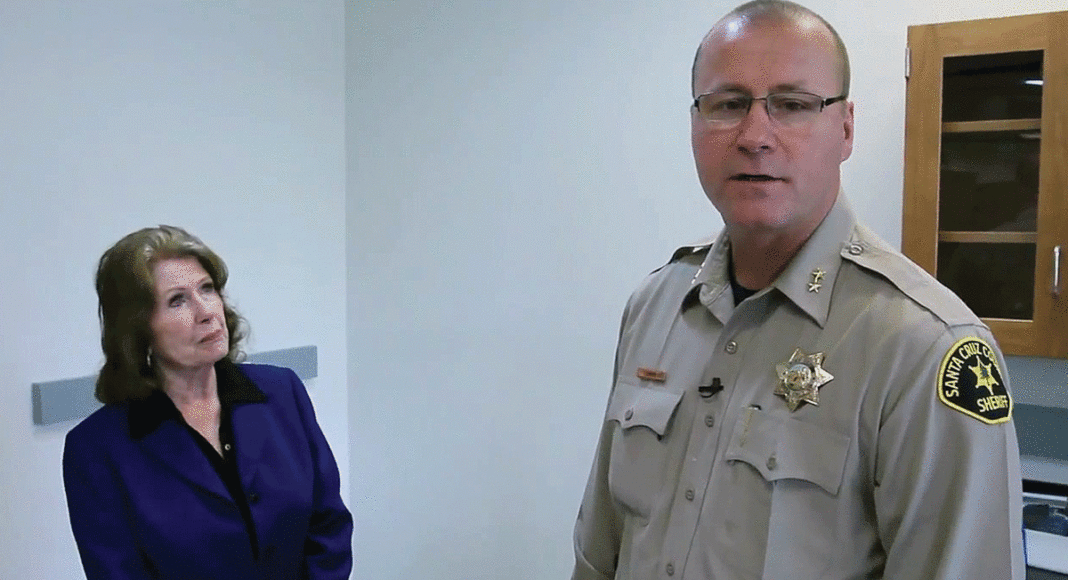When deputies arrest an individual, the county jail often processes the suspect and takes fingerprints. If the suspect is undocumented, he or she may already have fingerprints in a database maintained by Immigration and Customs Enforcement (ICE). The federal agency would receive a notification that the person is in custody.
What happens next varies, depending on the law enforcement and jurisdiction.
Places like San Francisco and San Jose are at one end of the spectrum, with “sanctuary city” ordinances preventing law enforcement agencies from using funds to participate with ICE. They’ll usually only cooperate with the agency when a suspect has committed a violent felony.
At the other end of the spectrum, agencies such as the Monterey County Sheriff’s Office fully cooperate with ICE, honoring the agency’s request to hold undocumented individuals, and even allowing agents to establish an office in the jail.
Local immigration attorney Michael Mehr says Santa Cruz County, which reinforced a version of sanctuary status earlier this year, falls somewhere in the middle of that spectrum. Sheriff Jim Hart hasn’t gone as far as some leaders who refuse to work with ICE. Instead, he limits the degree to which his officers and department coordinate with the agency.
A growing chorus of Santa Cruz-based defense attorneys worry Hart’s policies don’t protect the immigrant community and that, even worse, they betray public statements Hart has made regarding the issue.
Hart, meanwhile, says he’s baffled by the criticism, given the public position he has taken in support of the immigrant community. A well-known supporter of statewide criminal justice reform, Hart is the only Sheriff in California who’s publicly supported Senate Bill 54, a piece of legislation that would prevent the law enforcement agencies from using resources to assist federal immigration agencies.
“The fear of detention, deportation and family separation is very real and is having negative impacts for public safety and law enforcement,” Hart wrote in a letter to State Senate President Pro Tem Kevin de Leon dated May 10. “Public safety is not enhanced when local law enforcement officers enforce immigration laws or act in a manner that causes suspicion within the diverse communities they serve.”
While many law enforcement officials have vehemently opposed the bill, Hart insists cooperation with ICE agents is bad for public safety. Hart has also publicly shut down any notion that the jail should hold undocumented immigrants for a couple days longer, after their release date, as some counties do, in order for ICE to more easily apprehend them.
Jonathan Gettleman, a civil rights lawyer based in Santa Cruz, appreciates the sentiment.
But he says that, if the sheriff believes that coordinating with ICE makes for bad policy, he should not let ICE agents into the jail for them to interview individuals. And even though the sheriff won’t do so-called “ICE holds” as the federal agency would prefer, Hart’s office will still supply the release dates of people detained in jail—at the feds’ request—allowing suspects to be apprehended just before they leave.
“I have misdemeanor clients who are terrified,” Gettleman says. “A lot of them feel it’s a better option to be out on a warrant rather than come to court. It’s a legitimate concern.”
Hart says closing off the jail to ICE would amount to discrimination against one federal agency, given that the department does cooperate with other state and federal agencies, including the FBI and California Highway Patrol.
He points out that the sheriff’s office recently returned a Department of Homeland Security (DHS) grant worth $75,000 that Hart could have used to purchase coastal protection boats. Hart says his department wants to avoid any entanglement with DHS, the federal department that oversees ICE.
Even so, Kathy Licker, an attorney with the Santa Cruz County Public Defender’s Office, says she remembers an undocumented client who was arrested for misdemeanor possession of drug paraphernalia and was processed and released on his own recognizance—meaning that he promised to appear for all future hearings. ICE agents picked him up in the community soon after, she says. Licker says she hasn’t heard from him since.
“People are being deported for having a marijuana joint,” Mehr says. “People don’t understand that because state law says it’s okay, but it’s a federal deportable offense. It’s a trap for the unwary.”
All three attorneys say there’s nothing preventing Hart from implementing provisions of SB 54 in his own department right now, to make the department stop providing release dates to ICE upon request and also stop letting agents into the jail.
Hart says he would rather wait for the legislature to specifically stipulate policy for law enforcement’s cooperation with ICE, rather than arbitrarily insert and enforce his own rules. “I have gone as far as I can to both follow the law and be supportive of our immigrant community,” he says.
Licker says the sheriff acknowledged that these policies are detrimental to the community in his letter, making his continued tolerance of them all the more baffling.
“The sheriff has written a letter saying such policies run counter to public safety, yet he continues to implement these policies while waiting on SB 54,” Licker says. “I don’t understand the acknowledgement this is not good policy on the one hand, while he continues to enforce it on the other.”












“The fear of detention, deportation and family separation is very real and is having negative impacts for public safety and law enforcement.”
Too bad! If you aren’t illegal then there should be NO FEAR! If there were no ILLEGALS then our law enforcement teams and communities wouldn’t have these issues.
Suck it up Santa Cruz (and California) – illegal is ILLEGAL – Law Enforcement is here to address ILLEGAL no matter what it is.